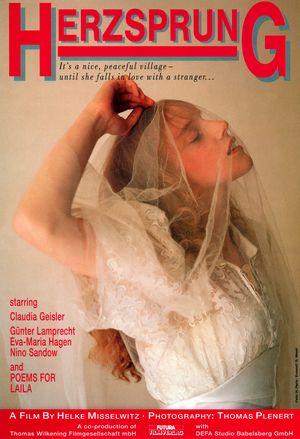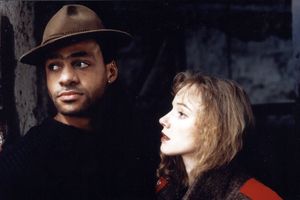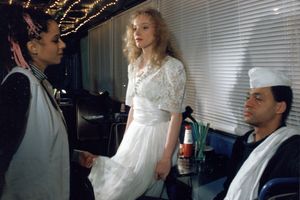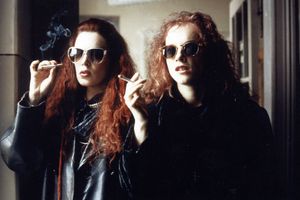Herzsprung
Director: Helke Misselwitz, 87 Min., Color, Feature Film
Deutschland
DEFA Studio Babelsberg GmbH / Thomas Wilkening Filmgesellschaft mbH / Zweites Deutsches Fernsehen (ZDF), 1992
- Film/Video Format
- 35 mm
- Length in m
- 2387
- Other Title
- Illusion des Erwachens
- English Title
- Herzsprung
- Premiere Date
- Release Date (for Cinema)
- Premiere Air Date (for TV)

(Dir.: Helke Misselwitz, 1992)
Short Summary (English)
Herzsprung. A desolate village in the middle of nowhere in Brandenburg. All that Herzsprung has to offer is a supermarket, a pub with a disco, and two memorial stones on the village green. Following the reunification of Germany the social life here is at an all-time low and economically the village is running on empty.
Lily-white feathers appear to fall from the ‘sky’, but the poetic scene, an idyllic fairytale world is just a lie: in reality the women pluck slaughtered geese in the canteen kitchen of a former East German factory, and it’s difficult to ignore the comparison that the women are also being deceived. When the kitchen is forced to close after the reunification due to the poor economic situation, Johanna, a mother with two children, finds herself on the streets. Her husband, a farmer, isn’t earning a penny either - he can’t sell his cattle any more as there’s no one there to buy them. Rock bottom is reached when he, frustrated and drunken, carries out a massacre on his livestock and then kills himself.
Johanna desperately searches for a new job in order to put food on the table for her children, to no avail. At the employment office she is classified as welfare citizen, unfit for a placement as she’s a single mother. In the meantime she meets a German-African who works at the fast-food stand on the motorway. She falls in love with him, allowing her at least sometimes to block out the dismal life she leads. Word of the relationship gets round the village quickly, which doesn’t do a lot to improve Johanna’s job prospects.
On New Year’s Eve, her companion is assaulted by youths on the motorway, tied to a tree and threatened with knives. It is a warning that he should get out of the village. The situation escalates...

(Dir.: Helke Misselwitz, 1992) Photography: Helga Paris

(Dir.: Helke Misselwitz, 1992) Photography: Helga Paris
Film Crew
- Director
-
- Helke Misselwitz
- Script
-
- Helke Misselwitz
- Camera
-
- Thomas Plenert
- Film Editing
-
- Gudrun Plenert (geb. Steinbrück)
- Cast
-
- Claudia Geisler (Johanna)
- Günter Lamprecht (Jakob)
- Eva-Maria Hagen (Elsa)
- Nino Sandow (Fremder)
- Tatjana Besson (Lisa)
- Ben Becker (Jan / Soljanka)
- Steffen Schult (Schnauze)
- Peter Planitzer (Glatze)
- Gabriele Gysi (Verrückte)
- Hanns Zischler (Herr Papenfuß)
- Bärbel Bolle (Erste Küchenfrau / Postfrau)
- Margit Bendokat (Zweite Küchenfrau)
- Helga Gloger (Dritte Küchenfrau)
- Shipra Roy (Shipra)
- Peter Brasch (Personalchef)
- Heike Ludwig (Angestellte)
- Mike Mareen (Mike)
- Leo Drohtmann (Mann im Diner)
- Petra Tschörtner (Frau im Diner)
- Claudia Beewen (Sekretärin)
- Cesare Basile (Sergio)
- Jaleh Amini (Türkin)
- Memduh Aki (Türke)
- Nora Kauffeld (Kind)
- Paul Schäfer (Kind)
- Peter Hiller (Käufer)
- Lutz Schneider (Käufer)
- Heike Haberland (Stunt)
- Band "Poems for Laila"
- Zentrales Orchester der Westgruppe der russischen Streitkräfte
- Assistant Director
-
- Hanna Seydel
- Assistant Camera
-
- Florian Wimmer
- Volker Langhoff
- Production Design
-
- Lothar Holler
- Music
-
- Aram Iljitsch Chatschaturjan (Maskerade - "Walzer")
- Georges Bizet (Perlenfischer - "Au fond du temps saint")
- Giuseppe Verdi (Aida - "Tu'che dal nulla hai tratto", "Danca sacra della Sacerdotessa")
- Jack Strachey ("These Foolish Things")
- Bulat Okudsawa ("Ach die erste Liebe")
- Helke Misselwitz (Musikzusammenstellung)
- Sound
-
- Paul Oberle
- Klaus Hornemann (Tonmischung)
- Musical Performance
-
- Billie Holiday (Gesang: "These Foolish Things")
- Eva-Maria Hagen (Gesang: "Der schwere Traum" (Volkslied); "Heimat, süße Heimat" (Küchenlied); "Ach die erste Liebe")
- Nino Sandow (Gesang und Akkordeon: ""Samba"; "Romantische Weise")
- Band "Poems for Laila" ("Far away"; "In my Frame"; "The Morning after")
- Zentrales Orchester der Westgruppe der russischen Streitkräfte ("Alles was war"; "Sag warum")
- Costume Design
-
- Ursula Wolf
- Make-Up
-
- Lothar Stäglich
- Rosemarie Stäglich (geb. Wittke)
- Props
-
- Klaus Selignow
- Oliver Kadenbach
- Production Management
-
- Andreas Hoffmann
- Unit Production Management
-
- Hartmut Damberg
- Matthias Hammer
- Executive Producer
-
- Thomas Wilkening
- Content Editing
-
- Christoph Holch (ZDF)
- Design
-
- Grischa Meyer (Titel)
- Gerd Petrasch (Titel)
- Consulting
-
- Wolfgang Lindner (Stunt)
- Frank Haberland (Stunt)
- DEFA Photography
-
- Helga Paris
Awards
- 40. Internationales Filmfestival San Sebastian (17.-26.09.) (1992): lobende Erwähnung Sektion 'Erstlingsfilm' an - Helke Misselwitz
- Prädikat (Deutsche Film- und Medienbewertung (FBW)) (1992): wertvoll
Short Summary (German)
Ein kleiner Ort namens Herzsprung im Nordosten Deutschlands nach der Wiedervereinigung. Alles ist in Auflösung. Die russischen Soldaten ziehen ab, die Betriebe schließen, die Leute verlieren ihre Arbeit. Auch die junge Johanna, die in einer Betriebsküche gearbeitet hat. Sie begegnet einem fremden, dunkelhäutigen Mann. Ihr eigener Mann Jan ist durch die Arbeitslosigkeit aus der Bahn geworfen worden, läuft Amok und kommt ums Leben. Ihr Vater verbindet sich mit ihrer älteren Kollegin Elsa, die nicht allein sein möchte. Ihre Freundin Lisa erfüllt sich ihren lang gehegten Traum. Sie übergibt Johanna ihren Frisiersalon und macht sich auf den Weg in den Süden. Johanna verliebt sich in den Fremden, der in einem Imbißwagen an der Autobahn arbeitet. Ein junger Arbeitsloser, Soljanka, der sich mit seinen Freunden zu einer Bande zusammengeschlossen hat, ist empört darüber. Schon lange begehrt er Johanna und zündet nun den Wagen des Fremden an, will ihn erstechen und tötet dabei das Mädchen Johanna, das sich schützend vor den Geliebten stellt.
(Quelle: Das zweite Leben der Filmstadt Babelsberg. DEFA-Spielfilme 1946-1992)



